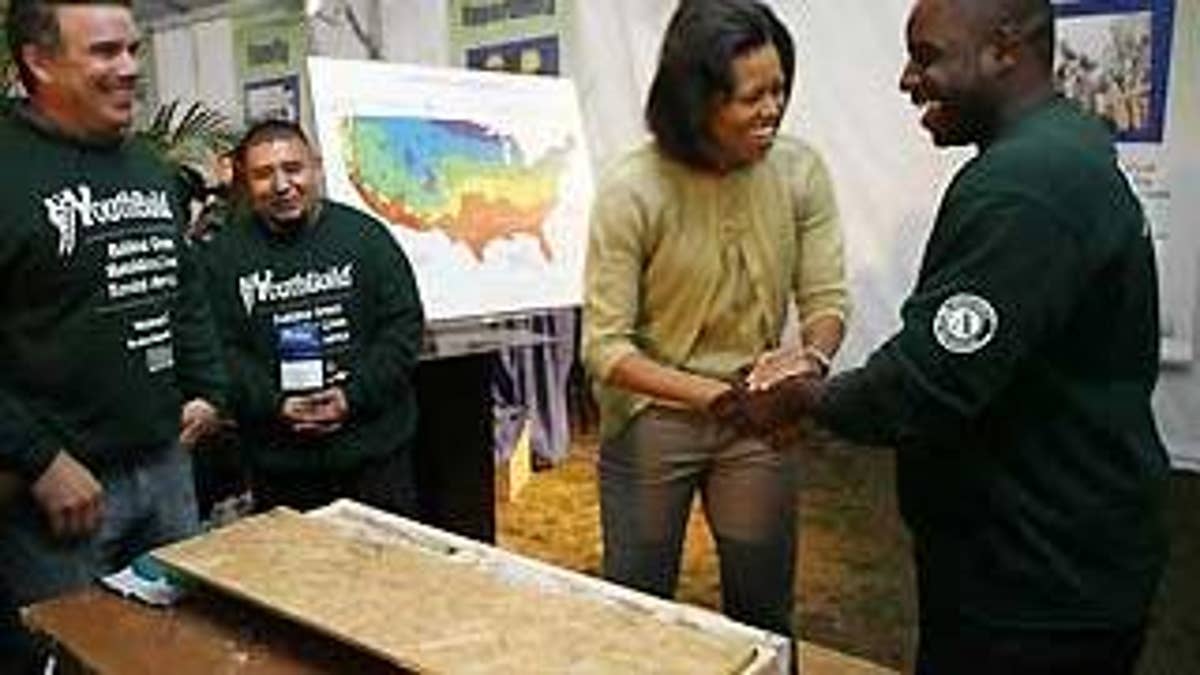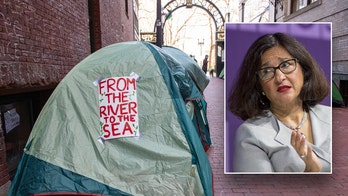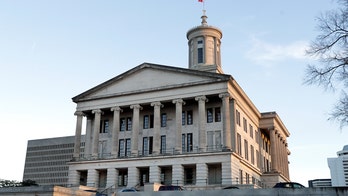
Nancy Reagan just said no to drugs. Barbara and Laura Bush said yes to literacy. And Hillary Clinton tried in vain to create universal health care coverage.
Michelle Obama has big shoes to fill as America's first lady, but so far more attention has been paid to the brand of those shoes -- as well as her dresses and biceps -- than her initiatives.
As President Obama grapples with multiple crises at home and abroad, the jury is still out on whether his wife's policy work will be a feather in his cap or an albatross around his neck.
In her first 100 days as first lady, Obama has stayed busy -- reaching out to military families, serving in soup kitchens, visiting Washington public schools and health care facilities and inviting children to the White House.
"Mrs. Obama feels honored and privileged to be the first lady, and in the last few months she has been able to serve in a way that is authentic to her," an aide to Michelle Obama told FOXNews.com. "She is a working mother and wife and her priorities are family, community and service."
The first lady of the United States has no formal portfolio or official job description, and the lack of definition may be one reason the role is rife with potential pitfalls. In addition to hosting the social functions held at the White House, first ladies must figure out which issues they will tackle -- issues that ultimately define them. And all have been criticized at one point or another, usually for something they did, said or wore.
First lady experts who spoke to FOXNews.com gave Obama a passing grade for her performance so far, and they say they think she's just getting started.
"She has the potential to be a powerful voice for the issues that working families confront and the juggling that working parents have to do," said Debbie Walsh, director of the Center for American Women and Politics at Rutgers University. "There are a whole host of issues that go with working families. We have to see where that goes."
Walsh said Obama epitomizes how the role of first lady is evolving.
"I think first ladies 50 or 60 years ago were lifelong helpmates," she said, explaining that it was a reflection of the times when women traditionally stayed at home.
Betty Ford was among the first to transform the role of first lady, being an advocate for women's rights and access to health care, though it wasn't until after her husband Gerald Ford's presidency that she took her personal battles public and delved into advocacy for aid to drug and alcohol abusers.
It was Hillary Clinton who transformed the role of first lady by calling herself the "co-president." Within the first five days of her husband's administration, Clinton went into action after the president named her to head his task force on health care reform.
"Hillary Clinton is kind of a special case," said Myra Gutin, a first lady historian and professor of communications at Rider University. "She was the only first lady to have an office in the West Wing," where she had 600 employees under her.
Laura Bush took a much slower route to the limelight. She started out by advancing her trademark interests of education and literacy and championing women's causes. It wasn't until after Sept. 11, 2001, that Bush became a champion for human rights -- and especially women's rights -- in underdeveloped countries.
Every potential first lady confronts the question of whether she will be politically active or perform the more traditional role of a wife.
Obama is confronting that same decision, but she also is facing the challenge of being compared to one of the most glamorous -- but quieter -- first ladies, Jackie Kennedy.
In fact, much like Kennedy, media attention has focused more on Obama's style than substance. During her trip to Europe this month to accompany her husband to the G20 summit, her fashion choices and protocol-breaking touch of the Queen of England received most of the ink.
"It offends me, to tell you the truth," said Carl Anthony, a historian at the National First Ladies' Library. "I think it's more endemic of a problem in our culture. It's eating dessert and thinking it's dinner."
Anthony said one of Obama's biggest challenges may be to draw more attention to her substance.
"She's a very powerful public speaker," he said. "If she were to get out and speak with heart and get behind a particular issue, I think the media will focus on her substantive elements, other than the style."
It remains to be seen what issue Obama may latch onto. Historians note that it's still early in the presidential term for a first lady to decide which projects to pursue. At this point, most are still adjusting to life in the White House.
"I personally am willing to cut her slack if she hasn't transformed the world for working families yet," Walsh said. "She's carving out a focus.
"It's a let's-wait-and-see mode, and every indication is she is planning to use her position as first lady to advocate for these positions."
But projects for first ladies rarely materialize out of thin air, Gutin said.
Lady Bird Johnson was a lifelong proponent for the beautification of the country's cities and highways and conservation of natural resources, and she made it her major initiative. Rosalyn Carter focused on improving mental health when she was first lady of Georgia. Nancy Reagan took on drug abuse when she was first lady of California.
"Some of them have a long history," Gutin said. "That's not the case with Mrs. Obama."
Gutin said she believes Obama can achieve a lot by working with military families, a focus that will allow her to avoid more controversial subjects.
"It would seem not to carry a lot of political risk for her husband," she said.
That would be a lesson learned from Barbara Bush, who stumbled as first lady when she declared that assault weapons should be banned following a shootout on a California playground that left five school children dead.
When Bush later learned that President George H.W. Bush opposed gun control, her spokeswoman said the first lady would not comment on the issue again.
Gutin said regardless of what Obama chooses, she thinks she is doing a "great" job so far.
"I think she came from a place a year ago where we didn't think she was going to do quite as well," she said, referring to comments last year in which Mrs. Obama said she had not as an adult been proud of her country until she saw the public's reaction to her husband's candidacy.
Obama's negative public opinion scores at one time were higher than her positive scores, but things began to turn around for her last summer when she appeared on ABC's "The View" and presented a softer side, cracking jokes and defending her patriotism.
Some attribute her performance so far to her awareness of the significance of being the first black first lady.
"I think as a result of that, she wanted to be very cautious," said Anthony, of the first ladies library. "I think she's wanted to really make sure she didn't have one misstep."




